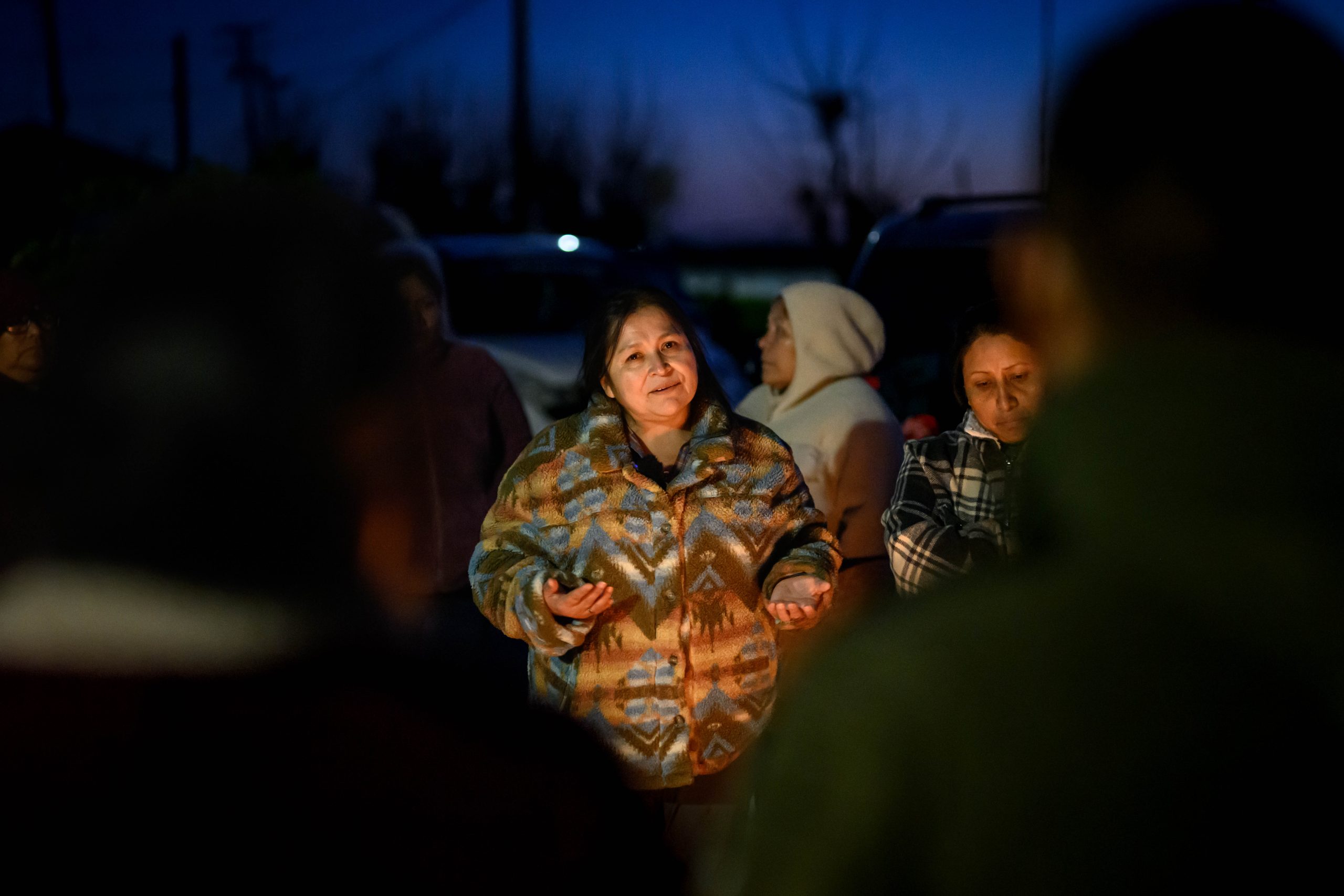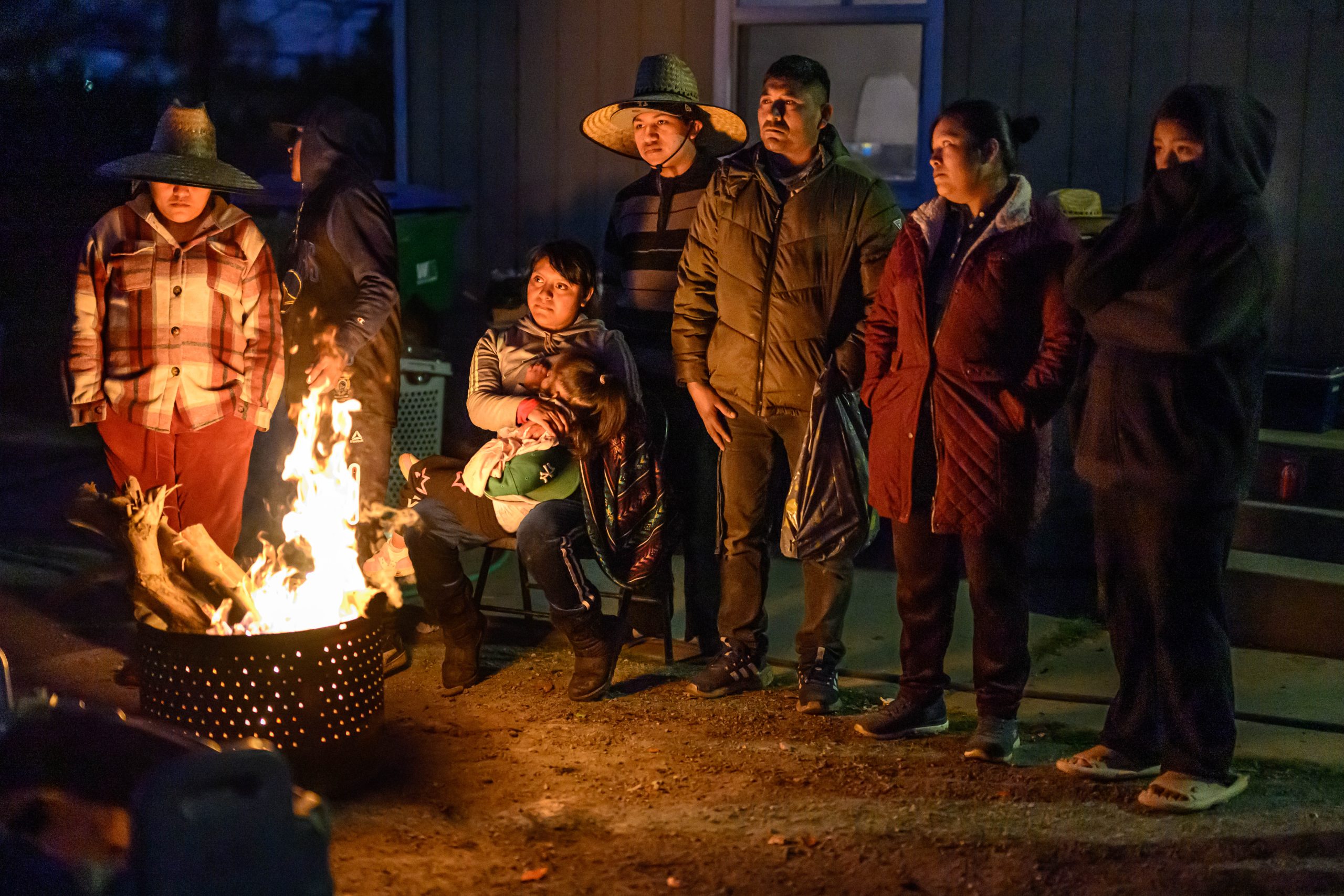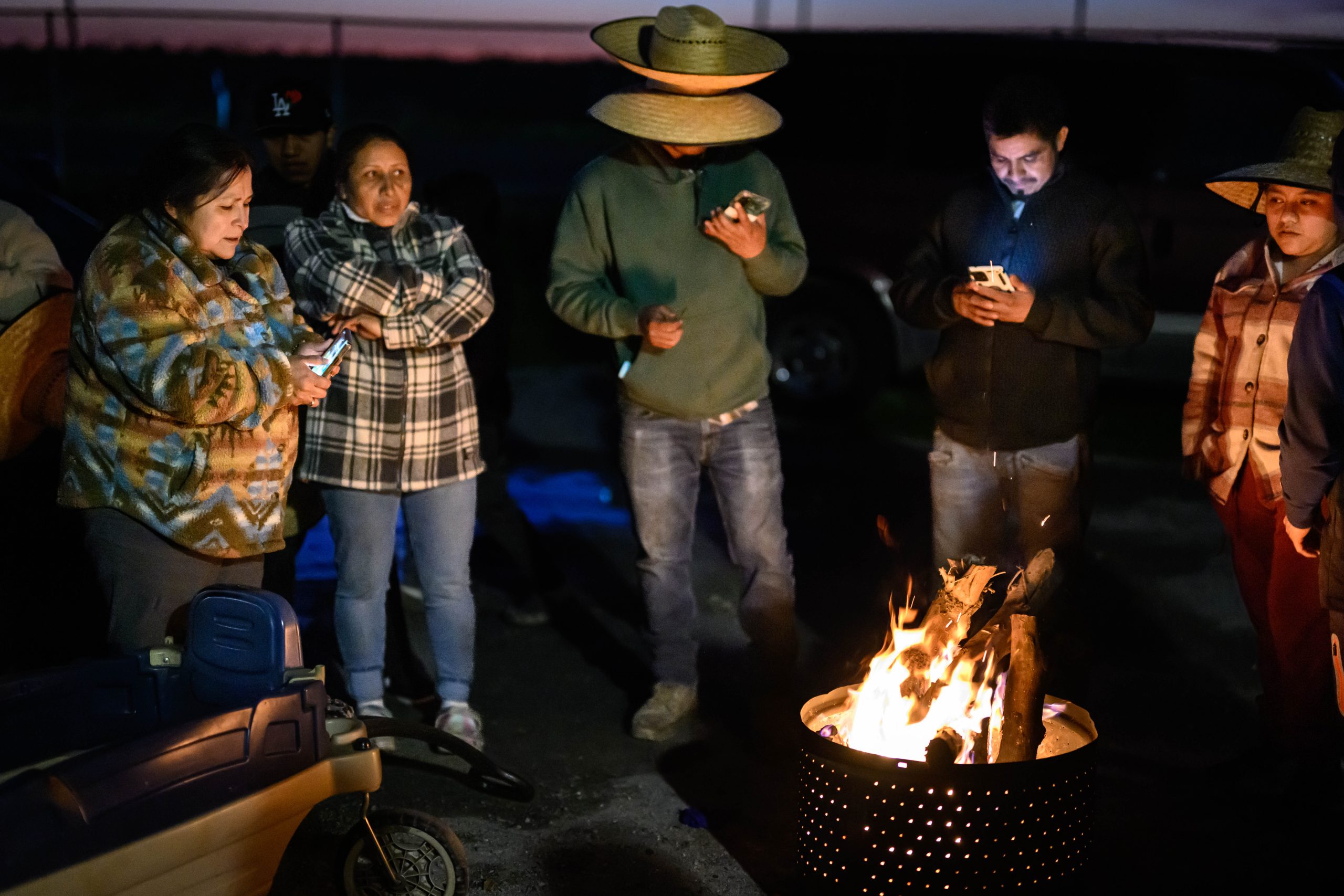
Este es un trabajo colaborativo de los periodistas Peter Schurmann, Nicolás Díaz Magaloni y Manuel Ortiz Escámez, de Península 360 Press y Ethnic Media Services.
De un día a otro, algunos ranchos agrícolas en el Valle Central de California se ven vacíos, y es que gran parte de las manos que trabajan dichos campos son inmigrantes indocumentados que, ahora, por miedo a ser arrestados y deportados en redadas del ICE, se han visto en la necesidad de no ir a trabajar, situación que no solo afecta sus bolsillos, sino a un sector primordial para el estado.
“Campesinos y campesinas de la zona están muy espantados, les tomó por sorpresa (estas redadas). La mayor parte de estas personas no están yendo a trabajar, por tanto, si los campesinos se paran, se para el campo californiano; el Valle Central es una región agrícola y es una de las más importantes del mundo, es decir, estos campesinos no solo trabajan para que nos alimentemos en todos los Estados Unidos sino en gran parte del mundo y estas son las devastadoras y terribles consecuencias de las redadas”.
Así lo dijo Manuel Ortiz durante el espacio de radio de Península 360 Press en el programa Hecho en California con Marcos Gutiérrez, donde presentó a Mari Pérez Ruíz, directora ejecutiva de la Alianza para el Empoderamiento del Valle Central, quien destacó el impacto de las redadas en el condado de Tulare por parte del Servicio de Inmigración y Control de Aduanas de EE. UU. (ICE, por sus siglas en inglés).
“Nuestras comunidades rurales aquí en el condado de Tulare han sido impactadas por las redadas de inmigración de ICE. Unas de las comunidades más afectadas fue la indígena de los estados de Guerrero, Chiapas y Oaxaca, y también ha creado mucha inquietud en nuestra comunidad agrícola que también es conformada por la comunidad filipina al igual que los mexicanos”, dijo Pérez Ruíz.
La activista señaló que, desde el día que comenzaron las redadas, se supo que estos agentes acudían a gasolinerías, supermercados, tiendas de alimentos y el campo, lugares donde los inmigrantes hacen sus tareas diarias, asegurando que buscan a personas que tienen algún problema legal o que han cometido algún delito, sin embargo, la organización ha corroborado que dicha narrativa es falsa.
“Se ha dicho la narrativa de que van por personas que tienen antecedentes o algo legal pendiente, pero lo que nosotros hemos visto en la comunidad es que no es cierto, no hay nada que haya corroborado esa narrativa que se ha dicho, el ICE viene a las comunidades donde la gente está haciendo cosas diarias como de ir a comprar comida para la familia, ir a trabajar, ir a poner gasolina a su carro para el día de trabajo, es lo que estamos viendo”, subrayó.

Asimismo, aseguró que familias han documentado que tienen miedo de que sus familias sean detenidas y necesitan recursos información, misma que no ha llegado de manera rápida y constante en las áreas afectadas.
En ese sentido, Mari Pérez Ruíz detalló que la organización que lidera está trabajando con organizaciones como Public Advocates de Sacramento y con la Unión de Campesinos (UFW, por sus siglas en inglés), con quienes se busca proveer de talleres a inmigrantes donde conozcan de sus derechos, y con ello puedan abogar por sí mismos y por sus seres queridos, incluso, prevenir una detención o la deportación.
Ante ello, Pérez Ruíz dijo que cuentan con una abogada por parte de la Unión Estadounidense de Libertades Civiles (ACLU, por sus siglas en inglés), de nombre Mayra, y quien está dispuesta a recibir llamadas directas de la comunidad para poder tomar sus datos y revisar sus casos y recursos para ayudarles ante una posible deportación. Su número de teléfono es el (213) 977-52-91, brindando servicios en los condados de Tulare y Kern.
Asimismo, dijo que la Alianza de Empoderamiento del Valle Central (CVEA, por sus siglas en inglés), también busca conocer a las familias impactadas por estas redadas, a fin de conocer sus necesidades.
“Nosotros como organización queremos saber cuáles son esas familias impactadas, porque a lo mejor tienen hijos, familias, que van a quedarse indefensas, que no van a tener recursos, y queremos conectar con quiénes son para poder ayudar con asistencia de renta, proveer comida, recursos legales, y poder darles la información que ellos necesitan, porque tienen muchas preguntas y no hay información constante”, dijo.
Mari Pérez Ruíz también proporcionó su número telefónico para aquellos que estén siendo afectados por las redadas, especialmente en los condados de Tulare, sin embargo, dan también atención a los condados de Madera, Fresno, Kern y Kings. Los interesados pueden contactarla al (916) 396-99-44.
“Nuestro intento no es de proveer servicios, aunque sí lo estamos haciendo, pero es de crear el liderazgo para poder cambiar nuestras comunidades para que tenga más equidad y que haya justicia racial y social”, puntualizó.
Por otra parte, recordó que en condados como Tulare y Kern hay un alto índice de personas que son afines a la retórica antiinmigrante de Donald Trump, desde propietarias de ranchos, hasta las mismas autoridades como Departamentos de Policías y Sheriffs.
A ello sumó que si bien el sector agrícola en el estado, tiene mucho que perder con estas redadas, son los dueños de estas granjas y ranchos los primero en obtener subsidios y ayudas por pérdidas en sus cosechas. Y es que, muchos de ellos creen que son los inmigrantes, sobre todo los indocumentados, los que reciben más ayuda en momentos de crisis como estos, sin embargo, la verdad es otra.
Arturo Rodríguez, también de CVEA, refirió que niños ya comienzan a presentar miedo ante las redadas, pensando en si pueden salir a jugar y no serán llevados.
“Lo más duro de ver fue que una niña y un niño, de cuatro y de seis años, tuvieron que preguntarle a su mamá si podían salir y si era seguro, también unos me platicaron que no han ido a la escuela estos últimos días. Entonces, ponte a pensar el terror que le puede pegar a nuestra infancia, a nuestros niños que no deberían estar preocupados por cosas de adultos, ellos deben estar preocupadas por ir a jugar, por ir a la escuela, por ponerse sus mochilas, por taparse la cabeza porque está haciendo frío, pero no de tener miedo de salir a la tienda o de salir al frente de su casa porque se pueden llevar a su papi o a su mami e, incluso, hasta ellos”.
Manuel se encuentra con los periodistas Peter Schumann y Nicolás Díaz Magaloni en la ciudad de Poplar, del condado de Tulare, una zona rural donde realizan un trabajo de colaboración entre Península 360 Press y Ethnic Media Services.
Allí, dijo Manuel, los tres han estado recorriendo la zona y para su sorpresa, las personas les han dicho que pensaban que las redadas eran un invento de la prensa, rumores que habían lanzado para preocuparles, pero aún falta una semana para que Donald Trump tome protesta como el próximo presidente de Estados Unidos y las cosas ya se ven graves, pues algunos interpretan estas pesquisas como un mensaje de las autoridades locales, particularmente de policías, para La Casa Blanca para el nuevo presidente, “decirle: estamos aquí, estamos con usted, a sus órdenes”.

Explicó que también han escuchado testimonios de que los oficiales de inmigración están siguiendo un perfil étnico y racial, “es decir, por la apariencia de las personas es como están deteniendo”.
A ello sumó que hay una propuesta de ley, la HR29, que ya fue la aprobada en la cámara de representantes con respaldo demócrata y republicano, y que ahora va al Senado, esperando que sea aprobada antes del 20 de enero, día en que Trump toma el poder, e implica que “los agentes de inmigración van a poder detener con mucha más facilidad a cualquier persona, no necesariamente se van a enfocar en delitos graves, ya lo están haciendo, lo estamos viendo en Valle Central, pero esta ley todavía les va a facilitar mucho más este tipo de comportamiento como el que estamos viendo aquí”.
Manuel, Peter y Nicolás continúan buscando a los dueños de granjas y ranchos en el Valle Central para conocer su punto de vista de estas redadas y como afecta a sus negocios, sin embargo, dijeron, no es tarea fácil.
Manuel Ortiz llamó a hacer conciencia de que las redadas son reales y están sucediendo en diferentes partes del estado.
“Es real lo que está sucediendo, tomen sus precauciones, organicen e identifiquen a las organizaciones de base que están en sus comunidades trabajando en estos temas, que se acerquen, que tomen los teléfonos necesarios y que hagan a estas organizaciones las preguntas que tengan que hacer o que incluso se acerquen a sus consulados, yo creo que es momento de unidad”, dijo.
“Estamos a unos días de un cambio que puede ser radical en los Estados Unidos, no lo sabemos, pero estas redadas han empezado, esto es real, así que hay que comenzar a prepararnos y a estar muy unidos, tanto periodistas comunitarios y organizaciones, muy unidos porque yo pienso que la unión va a ser lo que nos permita salir adelante de esto que se nos viene”, finalizó.
Te puede interesar: Detención de indocumentados en San Francisco genera preocupación en la comunidad inmigrante

